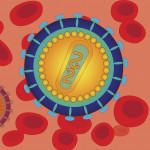A dendritic cell therapy by Argos Therapeutics, called AGS-004, was able to keep virus at least partially under control during a 12-week antiretroviral (ARV) treatment interruption, according to a study presented Monday, July 19, at the International AIDS Conference (IAC), being held July 18 to 23 in Vienna.
AGS-004 treatment involves a three-step process. First, researchers collect a person’s dendritic cells—an immune cell that presents fragments of viruses or bacteria to CD4 cells. The researchers then load the dendritic cells with HIV messenger RNA derived from the specific strains of HIV that a person carries. Lastly, the dendritic cells are reintroduced by infusion. The scientific poster presented at IAC by Jean-Pierre Routy, MD, from the McGill University Health Center in Montreal, and his colleagues included data on additional patients from the AGS-004-001 study, which has been reported on before.
AGS-004-001 is a Phase IIa study designed to determine the safety and signs of efficacy of AGS-004 during a 12-week interruption of ARV treatment in 38 people with HIV. People with fully suppressed HIV for at least six months while on ARV therapy and a CD4 count above 450 were eligible to participate in the study.
During the study, participants received four monthly infusions of AGS-004 along with ARV therapy and then two further infusions during a 12-week treatment interruption. Virus levels during the treatment interruption were compared with a participant’s viral load before he or she started ARV therapy. Currently, 29 people have received AGS-004, and 18 have completed a full 12-week treatment interruption.
Routy reported that 15 of the 18 participants had reductions in virus from pre-ARV treatment levels, with an average drop of 1.29 logs. At the end of the 12-week treatment interruption, eight people had a viral load of less than 10,000 copies, and 6 had a viral load less than 5,000 copies. Three people failed to respond to the treatment, two because their CD4 count dropped below 350 during the treatment interruption. Side effects to therapy included injection site reactions, flu-like symptoms and gastrointestinal symptoms, with no AIDS-related complications emerging during the study.
“AGS-004 was safe, well tolerated and resulted in an unexpectedly long delay in viral rebound, time to peak viral load during a structured treatment interruption, and a markedly reduced viral load when compared to [pre-ARV treatment] levels,” Routy’s team concluded.
Argos hopes to begin a Phase IIb study this year to further explore AGS-004 treatment.
Advertisement
Advertisement
Advertisement






Comments
Comments